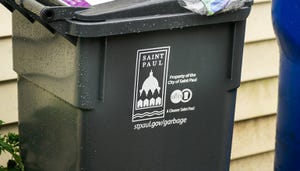Alliance to End Plastic Waste Funds Plastic Recycling Around the World
While financing and guidance come from the Alliance, local governments and local private sector partners are doing the on-the-ground work. The work typically begins with improving collection systems and in some cases establishing them where none exist, as in Indonesia on the island of Bali, which had no organized waste pick up.

In many parts of the world, recycling rates remain low— an estimated 1 percent to 5 percent of waste is recycled in markets such as Brazil and Mexico, and below 30 percent in markets such as South Africa and Vietnam. The Alliance to End Plastic Waste is working on projects to improve the stats, with funding from converters, brands, resin makers, waste management companies, and other supply chain stakeholders.
While financing and guidance come from the Alliance, local governments and local private sector partners are doing the on-the-ground work.
“Plastic waste management is a development challenge, and you need to respect where each country is on their journey and support them with location-specific solutions. That’s why we work with local partners. We need them to help us understand what needs to change in the model,” says Nicholas Kolesch, vice president of projects, Alliance to End Plastic Waste.
The work typically begins with improving collection systems and in some cases establishing them where none exist, as in Indonesia on the island of Bali, which had no organized waste pick up. This undertaking, orchestrated by Project STOP, entailed providing collection vehicles and staff, educating the community on why and how to segregate their waste, and then building a materials recovery facility (MRF) that now processes 50 tons of recyclables a day. The system, fully operational for more than two years now, was recently handed over to the government who has made it Bali’s own.
When the Alliance began working with Delterra in Argentina there was already a collection system in place, but recycling rates were low, presenting opportunity for improved source segregation into multiple streams with a focus on separating organics for compost. An education component zeroed in on improving participation. That’s the hard part; building the infrastructure is relatively easy, Kolesch says.
Community members showed up at homes to hand out information sheets and refrigerator magnets and explain the new process. Finding community leaders willing to work with residents was important.
“You want people from inside the community doing behavior change because it comes down to culture and knowing your neighbors. It was the same in Indonesia where the women’s association went door to door. This has a huge effect; it’s people who know how to get households to think differently to drive behavior change,” Kolesch says.
Waste characterization studies help inform changes for best outcomes. Factors like waste generation, collection rates, dumping, and proportion of waste collections handled by the informal sector are important information points.
Culture also is a major consideration. Some residents don’t want to deal with separating and valorizing waste. Others see value in it, Kolesch says.
“In South Africa we are working with a partner in townships surrounding Durban. These are lower income areas, and they will tell you they have a trash-to-treasure mentality. They are willing to see that waste is recovered to provide income for underprivileged communities. They are just missing infrastructure for more effective management, and we provide this through basic sorting centers,” Kolesch says.
Other areas already have collection infrastructure and don’t need the income from recyclable waste. It’s been harder to onboard households in these cases. You have to convince communities they should source segregate and of what needs to happen to enable their recycling economy to work, he says.
In China, through a project with local partner LOVERE, communities access smart bins from various city locations. They serve multiple purposes: cameras and a communications system inform LOVERE when the bins are full so they can dispatch haulers. But residents can also use an app on their cell phones to connect to their account that keeps a record of materials they deposit, which they are compensated for. At the same time, LOVERE can track incoming materials.
“We have supported the deployment of over 3,000 smart bins and have seen a strong uptake in community participation, as well as increasingly high quality of recyclable waste,” Kolesch says.
“When [LOVERE] started, most of that material was going to landfill. They have gone from no or very limited recycling to an astonishing rate of capturing over 70 material types at an aggregation center with sorting lines,” he says.
In regions where waste recovery is in early development stages, integrating the informal sector of waste collectors is a priority.
“This community is a critical stakeholder and ally in enabling effective waste collection and sorting. To engage informal workers, projects should focus on inclusive decision-making processes that incorporate their perspectives from the outset,” says Arun Rajamani, managing director and partner, Boston Consulting Group. Boston Consulting works with the Alliance to glean lessons learned from projects to be able to replicate and scale them.
As collections improve, the Alliance’s work moves on to building and or improving MRFs and working conditions.
In a basic recovery center in Indonesia or parts of Africa waste comes in on a truck and is tipped on the floor—sometimes under shelter and sometimes not—and workers pick through it. The Alliance and partners are setting up conveyance systems ergonomically designed so workers can stand and sort material as it moves along a belt.
That basic sorting is where value is created, so the more efficiency you have for workers on sorting lines the more monetary return, Kolesch says.
Rajamani points to two takeaways from the work in these regions: trust as a cornerstone for change to encourage the segregation of waste at source.
“We've observed that behavior change is gradual and may span years. Establishing a reliable and predictable collection schedule is crucial to enhance resident participation and trust, demonstrating that their efforts are managed responsibly and effectively,” he says.
As important he says, is strategic city selection. He references a project in Brazil implemented by Recicleiros.
“Only about 2 percent of cities that applied were accepted into the Recicleiros program in 2023 as project success largely depends on the cooperation from local municipalities. Project implementors must assess cities based on their need and willingness to participate in the joint effort required.”
The Alliance developed playbooks, available to anyone, that further detail these projects one on basic manual sorting and one on engaging households in waste segregation. Plans to publish the next series of them in 2024.
Says Kolesch: “There are a lot of great projects we want to use to demonstrate different models out there. We want to inspire others to undertake similar work to replicate solutions in their communities.”
About the Author(s)
You May Also Like




